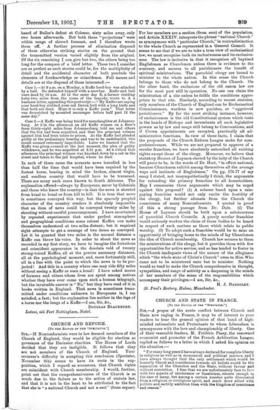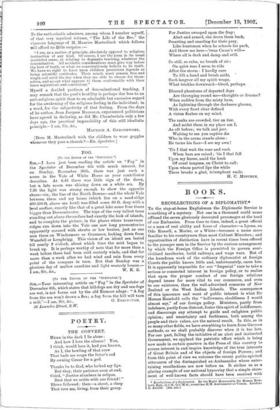CHURCH AND STATE IN FRANCE.
[To TRH EDITOR Of THE " SPIATAT01."]
SIR,—A propos of the acute conflict between Church and State now raging in France, it may be of interest to your readers to hear the general opinion of that band of high- minded rationalists and Protestants to whom Liberalism is synonymous with the love and championship of liberty. One of their venerable leaders, M. Frederic Passy, the renowned economist and promoter of the French Arbitration League, replied as follows to a letter in which I asked his opinion on the situation :—
" For many long years I have always declared for complete liberty in religious as well as in economical and political matters, and I have always thought that the only settlement which would be honestly liberal and considerate towards all beliefs would be the separation of the Churches and the State, without favour and without restriction. I fear that we are unfortunately face to face with two aspects of intolerance or fanaticism, sincere enough in the case of many, but among a certain number quite dissociated from a religious or irreligious spirit, and much more allied with politics and earthly ambition than with the kingdom of conscience and reason."
To the enthusiastic admirers, among whom I number myself, of that very mystical volume, "The Life of the Bee," the vigorous language of M. Maurice Maeterlinck which follows will afford no little surprise :—
" I am, as a matter of principle, absolutely opposed to religious instruction of any kind. Of course, I use the term in its usual restricted sense, as relating to dogmatic teaching, whatever the denomination. All aesthetic considerations must give way before the love of truth, or what we conscientiously believe to be truth. We have no right to force upon children precarious legends as being scientific certitudes. Their minds must remain free and virgin soil until the day when they are able to choose for them- selves, and accept what appears to them conformable with their inner aspirations and convictions."
Myself a decided partisan of denominational teaching, I may remark that the poet's hostility is perhaps due less to an anti-religious spirit than to an admirable but excessive regard for the awakening of the religious feeling in the individual; in a word, for the subjectivity of that feeling. From the days of its author, Jean Jacques Rousseau, experienced politicians have agreed in declaring, as did Mr. Chamberlain only a few days ago, the practical impossibility of this still idealistic principle.-1 am, Sir, &C., MAURICE A. GEROTHIVOHL.
[Does M. Maeterlinck wish the children to wear goggles whenever they pass a church P—En. Spectator.]



















































 Previous page
Previous page